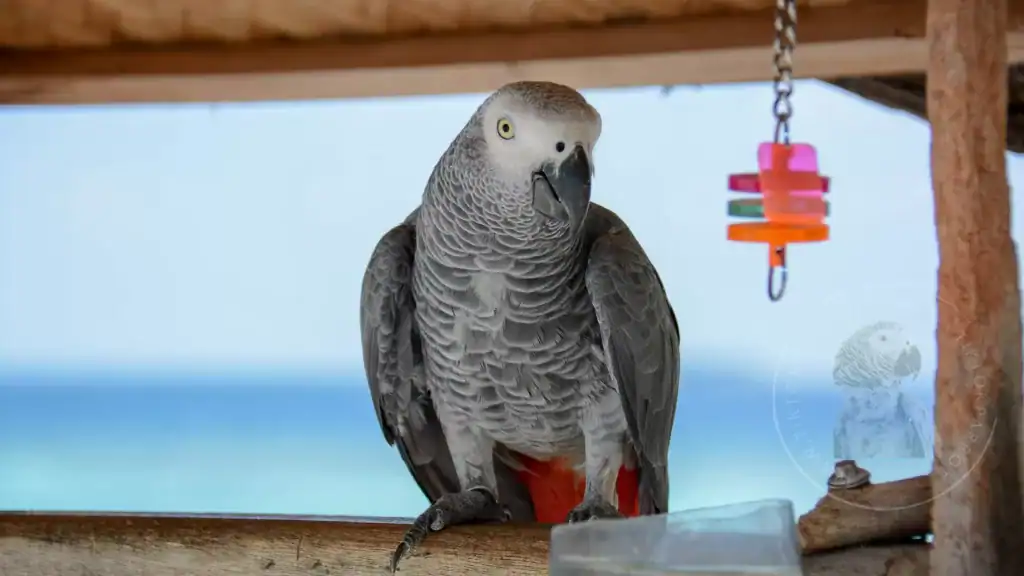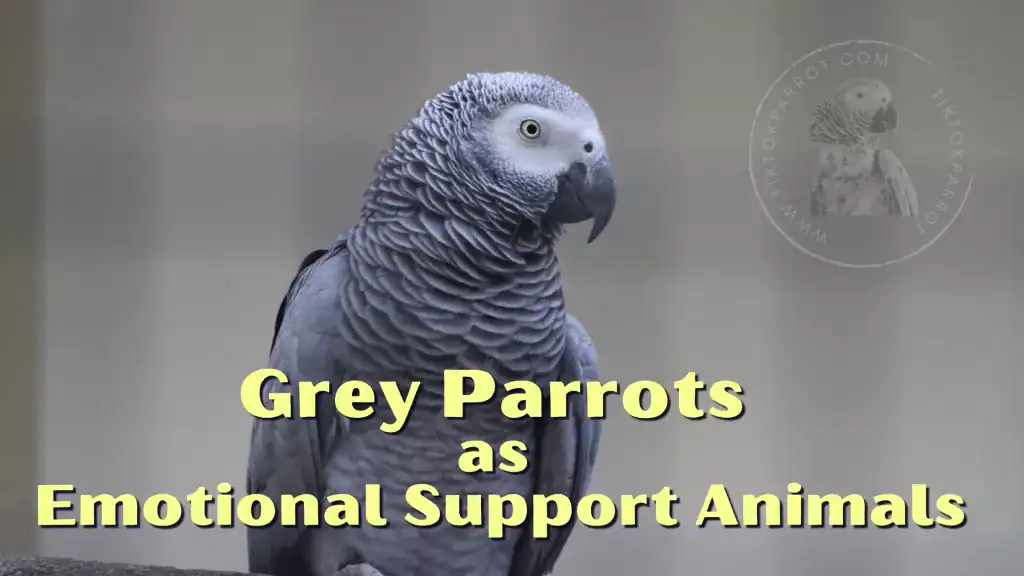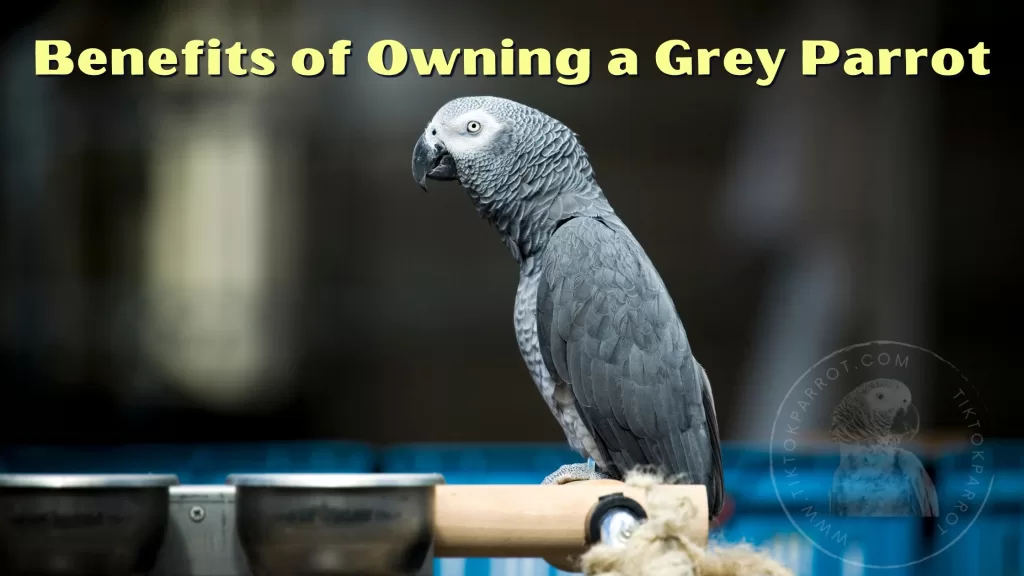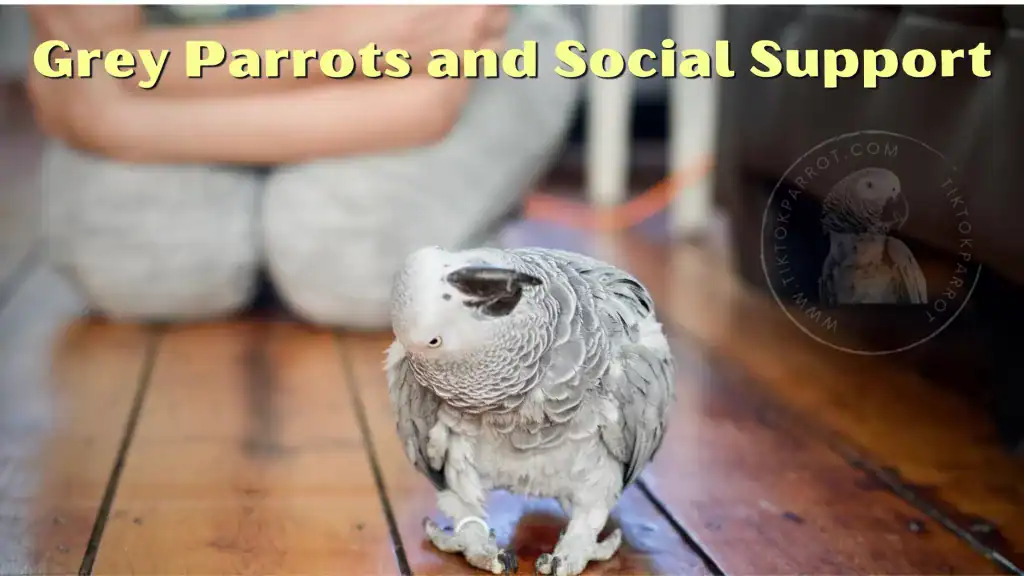At times, life can be tough, and we all need a shoulder to lean on. For some, emotional support comes in the form of a pet, it can be a bird, cat or dog and for me, that pet was a my grey parrot.
African grey parrots are an intelligent, sociable, and affectionate species of bird that make excellent companions for those seeking emotional support. These birds are also increasingly being recognized as emotional support animals, helping individuals cope with mental health issues such as depression, anxiety, and post-traumatic stress disorder (PTSD).
In this article, we’ll explore the ways in which grey parrots or any other pet can help individuals cope with mental health challenges and provide emotional support. I will share my personal experience with owning a grey parrot as an emotional support animal and how it has helped me through my darkest times.
Looking for a unique and effective way to manage your mental health? Consider the incredible benefits of owning a grey parrot as an emotional support animal! In this article, we explore the many ways in which these intelligent and affectionate birds can provide emotional support, companionship, and a sense of purpose to those struggling with mental health issues. From training tips to legal rights and protections, this article covers everything you need to know about owning a grey parrot as an emotional support animal.
Introduction
In this introduction section, I will provide an overview of the article, including the importance of emotional support animals and the benefits of owning a grey parrot.
Emotional support animals have become increasingly popular in recent years, as more and more people recognize the important role they can play in supporting individuals with mental health conditions.
These animals provide comfort, companionship, and a sense of security to their owners, helping to reduce feelings of anxiety, depression, and stress.
Grey parrots are one type of emotional support animal that have gained particular attention in recent years, thanks to their intelligence, affectionate personalities, and unique ability to mimic human speech. Also, here I will share my personal experience of owning a grey parrot as an emotional support animal, and discuss the many benefits they can offer to those struggling with mental health issues.
What are Emotional Support Animals?
Here I will define emotional support animals (ESAs) and explain their role in providing support to individuals with mental health conditions.
Emotional support animals are pets that are specifically trained to provide emotional support and comfort to individuals with mental health conditions. Unlike service animals, which are trained to perform specific tasks for individuals with physical disabilities, emotional support animals do not have any specialized training requirements.
To qualify as an emotional support animal, the pet must be prescribed by a mental health professional, who will provide a letter stating that the animal is necessary for the individual’s emotional well-being. This letter may be required in order to obtain certain accommodations, such as allowing the animal to live in a rental property that does not allow pets.
Why Choose a Grey Parrot as an ESA?
ESA stands for “Endangered Species Act”, In this part, I will discuss the unique characteristics of grey parrots that make them ideal as emotional support animals, including their intelligence, social nature, and ability to communicate with humans.
Grey parrots are an ideal choice as emotional support animals for several reasons. Firstly, they are highly intelligent and social animals that thrive on human interaction. They have a natural ability to form strong bonds with their owners, providing a sense of companionship and emotional support.
Additionally, grey parrots are known for their ability to mimic human speech, which can be particularly comforting for individuals who live alone or have difficulty communicating with others. Their playful and affectionate personalities can also help to reduce feelings of anxiety and depression, providing a source of joy and laughter.
My Personal Experience with Owning a Grey
In this section, I will share my personal story of how owning a grey parrot has helped me cope with my mental health issues. I will describe the ways in which my grey parrot has provided emotional support, including by providing companionship, reducing stress, and improving my mood.
I have owned a grey parrot for several years now, and can attest to the incredible benefits that this animal has provided me. My parrot, named Mitthu known as TikTokParrot, was a constant source of joy and companionship, providing me with emotional support during some of my darkest times.
One of the ways in which Mitthu has helped me is by providing a sense of structure and routine to my day. Owning a pet requires a certain level of responsibility and commitment, which can be beneficial for individuals struggling with depression or anxiety. By having a routine and a sense of purpose, I am better able to manage my mental health symptoms.
Mitthu has also helped me to reduce feelings of loneliness and isolation. As someone who lives alone, having a pet provides a sense of companionship and comfort that cannot be replicated by human interactions alone. He has helped me during code pandemic times as I was totally isolated and spent my maximum time with him. He made me laugh and kept me busy but also he made me cry till this day when I lost him.
Mitthu’s playful and affectionate nature was always bringing a smile to my face, even on the most difficult days. Sadly, he did not live long enough and died at the age of seven. 🙁
Benefits of Owning a Grey Parrot as an ESA
Here I will outline the various benefits of owning a grey parrot as an emotional support animal, including improved mental health, reduced feelings of loneliness and isolation, and increased socialization.
There are many benefits to owning a grey parrot as an emotional support animal. Firstly, they can provide a sense of companionship and emotional support, helping to reduce feelings of anxiety, depression, and stress. Their ability to mimic human speech can also be comforting, providing a sense of familiarity and connection.
Additionally, owning a grey parrot can help to reduce feelings of loneliness and isolation, particularly for individuals who live alone or have difficulty socializing with others. The playful and affectionate nature of these birds can also
help to increase socialization, as they are often a topic of conversation and can provide a shared interest with others.
Grey parrots can also provide a sense of purpose and responsibility, which can be beneficial for individuals struggling with mental health issues. Owning a pet requires a certain level of care and attention, which can help to create a sense of structure and routine in one’s day-to-day life.
Training a Grey Parrot as an ESA
Training a grey parrot as an emotional support animal requires patience, consistency, and a deep understanding of the bird’s unique characteristics and needs. It is important to establish boundaries and routines early on, and to use positive reinforcement techniques to encourage desired behaviors.
Socialization is also an important aspect of training a grey parrot as an emotional support animal. Exposing the bird to new people, environments, and experiences can help to increase their comfort level and reduce anxiety or fearfulness.
Legal Rights & Protections for ESA Owners
In this section, I will discuss the legal rights and protections afforded to individuals who own emotional support animals, including housing and travel accommodations.
Individuals who own emotional support animals are afforded certain legal rights and protections under the law. For example, the Fair Housing Act requires landlords to make reasonable accommodations for tenants who require emotional support animals, even if the landlord has a no-pets policy.
Similarly, the Air Carrier Access Act requires airlines to allow emotional support animals on board with their owners, provided that certain conditions are met. These conditions may include obtaining a letter from a mental health professional, providing advance notice to the airline, and ensuring that the animal is well-behaved and properly trained.
Understanding Grey Parrots
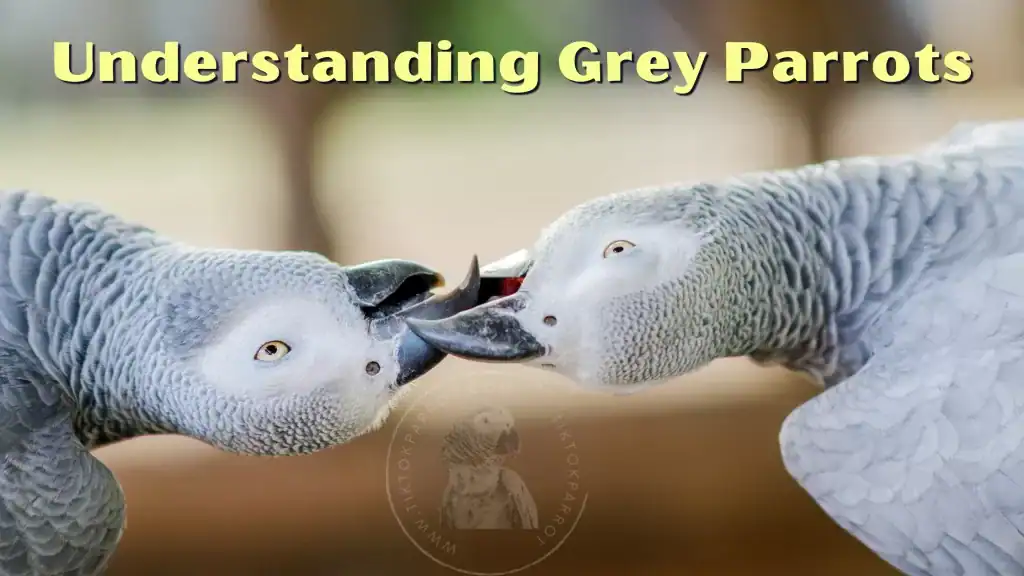
Grey Parrots are native to West and Central Africa and are known for their high intelligence, excellent mimicking abilities, and impressive vocabularies. They have a lifespan of up to 80 years if looked after well and require a lot of attention and care. Grey Parrots thrive in social environments and form strong bonds with their owners. They are known to be empathetic creatures that can sense their owner’s emotional state and respond accordingly.
If you are a bird enthusiast or considering adding a grey parrot to your family, this article will provide you with everything you need to know about this magnificent bird.
Appearance and Characteristics: The Grey Parrot, also known as the African Grey Parrot, is a medium-sized parrot that is primarily grey in color with a white mask around its eyes. They have a short, thick beak and a long tail. Grey Parrots are known for their intelligence, and they are one of the most popular pet parrots in the world. They are social birds and are known for their ability to mimic human speech.
Habitat and Distribution: Greys are native to the rainforests of West and Central Africa. They are found in countries such as Ghana, Ivory Coast, Cameroon, and Congo. The birds prefer dense forests with plenty of trees and vegetation, but they have also adapted to living in savannas and plantations.
Diet: These parrots are omnivores, meaning they eat both plants and animals. In the wild, their diet consists of fruits, nuts, seeds, and insects. As pets, they should be fed a balanced diet of pellets, fruits, vegetables, and occasional nuts.
Behavior: They are highly intelligent birds and require mental stimulation to prevent boredom. They are known for their ability to mimic human speech, and some can even learn to use words in context. Grey Parrots can be trained to do tricks, and they enjoy playing with toys.
Breeding and Lifespan: Grey parrots are monogamous birds and mate for life. They breed once a year, and the female lays two to four eggs. The eggs hatch after about 28 days, and the chicks fledge after about 12 weeks. The lifespan of a Grey Parrot is around 40 to 60 years, but some have been known to live up to 80 years.
Potential Health Issues: These birds are prone to some health issues, including Psittacine Beak and Feather Disease, Pacheco’s Disease, and Aspergillosis. Regular visits to an avian veterinarian can help prevent and treat these illnesses.
I would say greys are intelligent, social birds that make wonderful pets for the right person. They require a significant amount of care and attention, but the rewards are well worth it. We hope this guide has provided you with the information you need to understand and care for these magnificent birds.
Grey Parrots as Emotional Support Animals
As someone who has experienced mental health challenges, having a Grey Parrot as an emotional support animal has been life-changing.
Grey Parrots are incredibly empathetic creatures that can sense when their owner is feeling down or anxious. They will often snuggle up to their owner, preen their feathers, and provide comfort through physical touch.
Grey Parrots are also excellent at providing distraction from negative thoughts and emotions. They are playful creatures that love to engage in games and puzzles, providing a welcome distraction from the stresses of everyday life.
Their intelligence and inquisitive nature mean they are always looking for something new to explore and learn, which can be a positive influence on their owner’s mental health.
Grey Parrots are excellent communicators, using body language and vocalizations to express their emotions. This makes them perfect companions for those struggling to express their own feelings. They provide a non-judgmental ear to listen to their owner’s concerns and can offer a sense of comfort and support.
Grey Parrots and Social Support
One of the benefits of owning a Grey Parrot is the social support they provide. Grey Parrots are social creatures that form strong bonds with their owners.
They offer a sense of companionship and can help alleviate feelings of loneliness and isolation. This is particularly important for those who may not have a strong support network or who struggle to form meaningful relationships.
Grey Parrots can also be a source of motivation for their owners. They require a lot of attention and care, which can provide a sense of purpose and structure to an individual’s day.
Taking care of a Grey Parrot can provide a sense of responsibility and accomplishment, which can be beneficial for those struggling with their mental health.
Grey Parrots and Coping Skills
Coping with mental health challenges can be difficult, and it’s important to have a range of coping skills at your disposal.
Grey Parrots can help individuals develop coping skills through their playful and curious nature. They encourage their owners to engage in play and exploration, which can be a positive influence on their mental health.
Grey Parrots can also help individuals practice mindfulness. Mindfulness is the practice of being present in the moment and focusing on the present rather than worrying about the past or future. Grey Parrots live in the moment and are always fully engaged in their environment. Observing and interacting with a Grey Parrot can be a great way to practice mindfulness and reduce anxiety.
My Final Thoughts
Grey Parrots are intelligent, affectionate, and empathetic creatures that make excellent emotional support animals. They offer companionship, distraction, social support, and can help individuals develop coping skills. As someone who has experienced the benefits of owning a Grey Parrot, I can attest to their ability to provide comfort and support during times of need.
These birds are an ideal choice as emotional support animals for individuals struggling with mental health issues. These intelligent, social birds can provide a sense of companionship, reduce feelings of loneliness and isolation, and even help to improve one’s mood and overall mental health.
If you are considering owning a grey parrot as an emotional support animal, it is important to do your research and understand the unique needs and characteristics of these birds. With proper training, care, and attention, a grey parrot can provide a lifetime of love and companionship.
FAQs (Frequently Asked Questions)
Here are some of the frequently asked questions about pet as an emotional support;-
Can any pet be an emotional support animal?
Technically, any pet can provide emotional support to their owner. However, in order for a pet to be considered an official emotional support animal, it must be prescribed by a mental health professional and meet certain requirements.
What is the difference between a therapy animal and an emotional support animal?
Therapy animals are specially trained to provide comfort and support to individuals in settings such as hospitals, nursing homes, and schools. Emotional support animals, on the other hand, are prescribed by a mental health professional to provide support to individuals with mental health conditions.
Do I need a prescription for an emotional support animal?
Yes, in order to qualify for an emotional support animal, you must obtain a letter from a mental health professional stating that the animal is necessary for your emotional well-being.
How do I train my grey parrot to be an emotional support animal?
Training a grey parrot to be an emotional support animal requires patience, consistency, and a deep understanding of the bird’s unique characteristics and needs.
It is important to establish boundaries and routines early on, and to use positive reinforcement techniques to encourage desired behaviors. Socialization is also an important aspect of training a grey parrot as an emotional support animal.
Can emotional support animals be taken into public places, such as restaurants or stores?
The laws regarding emotional support animals in public places vary depending on the location and the type of animal.
Generally, emotional support animals are allowed in public places as long as they are well-behaved and do not pose a threat to others. However, it is important to check with the specific establishment to ensure that they allow emotional support animals on the premises.
Can emotional support animals be taken on planes?
Yes, emotional support animals are allowed on planes under certain conditions. The Air Carrier Access Act requires airlines to allow emotional support animals on board with their owners, provided that certain conditions are met.
These conditions may include obtaining a letter from a mental health professional, providing advance notice to the airline, and ensuring that the animal is well-behaved and properly trained.
Are emotional support animals the same as service animals?
No, emotional support animals and service animals are different. Service animals are specially trained to perform specific tasks for individuals with physical disabilities, while emotional support animals provide emotional support and comfort to individuals with mental health conditions.
What types of animals can be emotional support animals?
Any type of animal can potentially be an emotional support animal, as long as it provides comfort and emotional support to its owner. However, dogs and cats are the most common types of emotional support animals.
Do emotional support animals require any special training?
Emotional support animals do not require any specialized training, although it is recommended that they receive basic obedience training in order to ensure that they are well-behaved and do not pose a threat to others.
How can I obtain an emotional support animal letter?
To obtain an emotional support animal letter, you must first speak with a mental health professional, who will evaluate your mental health condition and determine whether an emotional support animal would be beneficial for you.
If the mental health professional determines that an emotional support animal would be helpful, they will provide you with a letter stating that the animal is necessary for your emotional well-being.
Can emotional support animals be denied access to certain places?
While emotional support animals are allowed in many public places, there are some exceptions. For example, certain establishments such as restaurants and grocery stores may be exempt from allowing emotional support animals on their premises.
Additionally, emotional support animals may be denied access to certain areas of an establishment if their presence would pose a health or safety risk.
Can emotional support animals live in rental properties that don’t allow pets?
Under the Fair Housing Act, landlords are required to make reasonable accommodations for tenants with disabilities, including those who require emotional support animals.
This means that landlords must allow emotional support animals to live in rental properties, even if the property has a no-pets policy. However, landlords may require tenants to provide documentation from a mental health professional verifying the need for an emotional support animal.
Do emotional support animals have any specific requirements for care?
Emotional support animals have the same basic needs as any other pet, including food, water, shelter, and exercise.
However, it is important to note that emotional support animals may have specific emotional and behavioral needs that require extra attention and care. It is important to work closely with a veterinarian and/or animal behaviorist to ensure that the emotional support animal is receiving the care and support it needs.
How do I know if an emotional support animal is right for me?
Deciding to own an emotional support animal is a personal decision that should be made in consultation with a mental health professional.
If you are struggling with mental health issues and believe that an emotional support animal could be beneficial for you, it is important to speak with a mental health professional to discuss your options and determine whether an emotional support animal is the right choice for you.
Are there any downsides to owning an emotional support animal?
While owning an emotional support animal can provide many benefits, it is important to consider the responsibilities and challenges that come with pet ownership.
Emotional support animals require time, attention, and resources, and may require additional care and attention if they have specific emotional or behavioral needs. Additionally, owning an emotional support animal may limit your housing and travel options, as not all establishments are required to allow emotional support animals on their premises.
If you found this blog helpful, It would be great if you could share it with your family and friends who might find it useful as well.
You might like to read these as well 🙂
The Battle of the Birds: African Grey Parrot vs Macaw
African Grey Parrot Male or Female? (Determine Gender of African Grey)
Is Your African Grey a Jealous Bird? Here’s What You Need to Know!
What diseases can African Grey parrots get?
Uncover the Fascinating World of Parrot Tongue Anatomy and Function
Types of African Grey Parrots
For more useful content about African grey parrots, you can subscribe my site with your email to get notification upon publishing a new blog, the subscribe box you can see on the right side of this page. Also if you get an alert on your web browser while browsing my site, allow it and that will also give you an alert whenever I publish a new blog. 🙂
Stay safe and much love !



